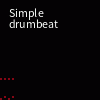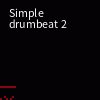09-01-2020, 10:25 AM
09-01-2020, 10:52 AM
Reverb is often added because it makes the sounds wider, more stereo. However, as mentioned, its muddy. Perhaps try making all your songs in plain mono so you aren't biased toward stereo sound when you add reverb. Reverb isn't a bad thing, it just should be used sparingly on OS. If you need a tail effect, try the OS delay instead (I like OS delay on the Ragtime Piano)
Reverb on kick is bad
We like to listen to music loud and thats great, but its not great for making music. If you are a beginner, try turning your computer volume real high and turning down what feels too loud instead. If you can, though, making music is much easier at lower volumes because you get a better sense of volume balance that way. I mix everything at a low volume, much lower than what I would listen at
Octave overload doesn't make a fuller sound! If you want a fuller sound, harmonize, especially with mid/low instruments for an epic fullness. Use background melodies, use pads, etc. https://www.youtube.com/watch?v=qgsSktZd0hk This video has a great advice on music and he explains how he gets that massive sound. Also they have awesome music
When you use only one instrument, things get really boring real quick. It isn't too bad with 8bit if you do it right, but piano only songs are lame. Try using instruments you think would often not use, and use them together maybe
Percussion is not hard!! For beginners, I will assume all your songs are 4/4. Try a cymbal or hat on every beat, a kick on every half measure, and a snare on every second half measure. The pattern should look something like this . Copy and paste from that if you want. I like to add variations to that drumbeat to give it more wow, like this
. Copy and paste from that if you want. I like to add variations to that drumbeat to give it more wow, like this  . You can use the same drumbeat in multiple songs if you need to and it will sound fine.
. You can use the same drumbeat in multiple songs if you need to and it will sound fine.
Elitism and sequence spamming are bad, if you really need someone to help you with criticism, you can send me a Private Message with the song, and I will eventually listen to it.
Mud often comes from 150Hz to 300Hz, or close to 500Hz. These frequency ranges are not bad, and make your songs sound warm and full, but the mud happens when they are too loud or when the notes collide with each other due to reverb or long release times. https://www.youtube.com/watch?v=hw7xu8yEpzM Any instrument you can hear a lot of this coming from, try to not use that one too much
I use the key guide still, as it really helps me to see the length between notes. As DCSM stated, use it as a tool, not a handicap. The biggest tip in music is rely on your EARS, not your eyes!
I hope this helps you to fix any of these issues if they apply to you, and you cannot seem to avoid them
Reverb on kick is bad
We like to listen to music loud and thats great, but its not great for making music. If you are a beginner, try turning your computer volume real high and turning down what feels too loud instead. If you can, though, making music is much easier at lower volumes because you get a better sense of volume balance that way. I mix everything at a low volume, much lower than what I would listen at
Octave overload doesn't make a fuller sound! If you want a fuller sound, harmonize, especially with mid/low instruments for an epic fullness. Use background melodies, use pads, etc. https://www.youtube.com/watch?v=qgsSktZd0hk This video has a great advice on music and he explains how he gets that massive sound. Also they have awesome music
When you use only one instrument, things get really boring real quick. It isn't too bad with 8bit if you do it right, but piano only songs are lame. Try using instruments you think would often not use, and use them together maybe
Percussion is not hard!! For beginners, I will assume all your songs are 4/4. Try a cymbal or hat on every beat, a kick on every half measure, and a snare on every second half measure. The pattern should look something like this
Elitism and sequence spamming are bad, if you really need someone to help you with criticism, you can send me a Private Message with the song, and I will eventually listen to it.
Mud often comes from 150Hz to 300Hz, or close to 500Hz. These frequency ranges are not bad, and make your songs sound warm and full, but the mud happens when they are too loud or when the notes collide with each other due to reverb or long release times. https://www.youtube.com/watch?v=hw7xu8yEpzM Any instrument you can hear a lot of this coming from, try to not use that one too much
I use the key guide still, as it really helps me to see the length between notes. As DCSM stated, use it as a tool, not a handicap. The biggest tip in music is rely on your EARS, not your eyes!
I hope this helps you to fix any of these issues if they apply to you, and you cannot seem to avoid them
09-02-2020, 01:18 PM
(09-01-2020, 10:52 AM)Lopyt Wrote: [ -> ]We like to listen to music loud and thats great, but its not great for making music. If you are a beginner, try turning your computer volume real high and turning down what feels too loud instead. If you can, though, making music is much easier at lower volumes because you get a better sense of volume balance that way. I mix everything at a low volume, much lower than what I would listen at
if you are mixing professionally, you normally want to mix fairly loud, but not oppressively loud. this is because of equal frequency contours (what were once called fletcher-munson curves); at low volume, midrange frequencies sound loud, and low and high frequencies sound quiet. the loudness of mid, low and high frequencies balances out the louder music gets, but if you mix at low volume, because you can't hear bass and highs very well, you're liable to make those frequencies (or the instruments producing them) too loud. there are industry standard volume levels for professional mixing and mastering (established by dolby and katz) but someone who wanted to match them would need to have a decibel meter handy.
we experience audio fatigue quickly listening at fairly loud volume, and fatigue makes high frequencies seem quieter, which is why mixing very loud is not a good idea, and taking frequent breaks when mixing is a good idea.
09-16-2020, 02:19 PM
(03-10-2018, 09:34 PM)Jonah Wrote: [ -> ](03-10-2018, 04:33 PM)Kirbyderp Wrote: [ -> ]It seems to me that your 2nd rule is pretty biased, reverb on drums can work.
You might be misinterpreting what I said. What I meant was that reverb shouldn't be used on the kick. You're right, it's a completely valid option for most of the drums, however, personally I'd advise against it when it comes to stuff like kicks and toms because those have a large amount of low-end frequencies. While the reverb that OS uses seems to have some form of low-cut (if it didn't, the problem would be much more noticeable and worse), but personally I don't consider it enough. Although you may be right that this opinion is biased, the genre I focus on tends to have really tight, short-envelope kicks, and I don't tend to listen to music that has more ambient style drums.
So yes, it could be a stylistic choice to use reverb on the drums for advanced users, but I think beginners should avoid it if they don't know what they're doing. It can lead to clashing in the low-end which would inevitably either lead to simply having a crappy sounding low-end, or turning the drowned out instruments up which leads to Loudness Overload and unequalization.
tl;dr: It's doable, but it's difficult and it can't be an afterthought.
I used quite a bit of delay in this track for the drums.
Especially starting at measure 41.
It was one of those things where I'm just messing around with it, but I tested it out, and it sounded kind of funky, so I kept it.
I am a percussionist, though, so maybe that plays into it. (Not an active percussionist, but I was in the band in middle school/high school/college)
12-18-2020, 11:45 AM
My cousin started playing Patch of exile some time ago. You know how it is at the beginning, everything seems so difficult, foreign, so I immediately advised him to invest in PoE currency. I tell him "cousin, you want to rock? Do you want to catch up with me faster? You need to buy PoE currency. As I told him he did, he now has more PoE currency than me and he feels much more confident when we play together."
https://odealo.com/games/path-of-exile/currency
https://odealo.com/games/path-of-exile/currency
12-18-2020, 11:42 PM
I usually use reverb on background stuff, like pads or flute or whatever ehen in the background, and delay on more focused stuff. Using reverb poorly is the best way to make everything really muddy
01-01-2021, 10:04 AM
Hi, I'm Patrick.
Hello Everyone, I'm new to the site and this forum.
Top 10 things: I'm with you! That all sounds like good advice to me.
Everything with a new learning experience is hard in the beginning and takes a long time to master.
Nothing new is easy for me. I'm pretty sure I probably have some hidden learning disabilities.
In music, one has many learning cross-references, as well as, often unspoken rules of practice to remember, learn - and to hopefully, to master.
I've learned a lot, mastered a few things, and foolishly not mastered others...
I have found that I still have a lot to learn and attempt to avoid plenty of mistakes that I've made in the past.
My biggest takeaway to offer: life is messy and not always very easy: Keep on learning your whole life!
Press on and don't give up!
All the very best!
Hello Everyone, I'm new to the site and this forum.
Top 10 things: I'm with you! That all sounds like good advice to me.
Everything with a new learning experience is hard in the beginning and takes a long time to master.
Nothing new is easy for me. I'm pretty sure I probably have some hidden learning disabilities.
In music, one has many learning cross-references, as well as, often unspoken rules of practice to remember, learn - and to hopefully, to master.
I've learned a lot, mastered a few things, and foolishly not mastered others...
I have found that I still have a lot to learn and attempt to avoid plenty of mistakes that I've made in the past.
My biggest takeaway to offer: life is messy and not always very easy: Keep on learning your whole life!
Press on and don't give up!
All the very best!
01-01-2021, 10:05 AM
Good luck MTGBuyer1!
01-13-2021, 09:50 AM
also, avoid the potato button














01-20-2021, 10:43 AM
How the heck do you make notes longer? I'm new and I don't know how to do anything. 
